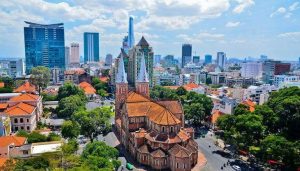Vietnam’s stock market has been on investor’s radars for a while. The Southeast Asian nation’s popularity is somewhat due to Vietnam’s similarities to China in the 1980s and 1990s during its much earlier stages of economic growth.

Equities and currencies all throughout Asia have seen a roller-coaster ride recently. Regardless, the Vietnam stock market is among Asia’s best, outperforming competing exchanges in places like Hong Kong and Thailand.
Perhaps the main problem that stopping foreigners from investing in Vietnam stocks is that it’s difficult. Notoriously heavy bureaucracy along with a lack of market information has arguably held Vietnam’s equity markets back more than anything.
Authorities have taken steps to fix these issues though. Banks have recently become friendlier toward foreign investors (even non-resident ones) in Vietnam while the government simplified its regulations.
Likewise, the Ho Chi Minh Stock Exchange, Vietnam’s largest in terms of market cap, removed all restrictions on foreign ownership at the end of 2015. The nation’s government is now in the process of privatizing a huge number of state-owned business too.
Yet although the websites of many stock brokerages and government departments are able to be browsed in English, their quality remains generally poor and there’s still lots of Vietnamese-only information.
With that said, there have been huge improvements in Vietnam’s equity markets over the past decade or so. These changes are making it much easier for foreigners to invest in Vietnam.
Buying stocks is the sole viable option for some foreign investors, in fact, since you can’t own freehold real estate in Vietnam.
In contrast with other countries in Southeast Asia, Vietnam has two major stock exchanges: the main Ho Chi Minh Stock Exchange (HOSE) along with the smaller Hanoi Stock Exchange (HSX).
Between those two exchanges, you can purchase about 700 different stocks in Vietnam. That’s a massive amount of choice for a frontier market.
Stock Exchanges in Vietnam
Ho Chi Minh Stock Exchange (HOSE)
Vietnam’s largest stock exchange
The market capitalization of around US$55 billion
Total listed stocks: 305
Average monthly turnover during the first half of 2015: VND34,660 billion (around US$1.55 billion)
Trading hours: 9 AM to 3 PM with a break from 11:30 AM to 1 PM
Hanoi Stock Exchange (HSX)
Vietnam’s second largest stock exchange
Market capitalization of around US$6.5 billion
Total listed stocks: 361
Average monthly turnover during the first half of 2015: VND11,520 billion (around US$0.50 billion)
Trading hours: 9AM to 3PM with a break from 11:30AM to 1PM
Invest in the Vietnam Stock Market
Foreigners can invest in both of Vietnam’s two major stock exchanges. While there are several restrictions on the HSX with regards to majority holdings, this shouldn’t become a factor for all except the wealthiest of investors.
1. Find a Stock Brokerage in Vietnam
Getting a brokerage account is a requirement for you to start investing in Vietnam stocks. With language barriers still a problem in this country, its usually better to open an account at one of Vietnam’s largest brokerage firms.
Vietnam’s biggest stock brokerages are likely to have someone on hand who can speak English if you visit a branch in a main business district. Such firms are generally more competent when compared to smaller ones as well.
Below are the five largest brokerage companies in Vietnam by market share:
Saigon Securities Incorporation
Ho Chi Minh City Securities Corporation
Viet Capital Securities Joint Stock Company
Vndirect Securities Corporation
ACB Securities Company Ltd.
2. Open a Vietnam Brokerage Account
Once you have selected a brokerage firm, they will ask for a number of documents to be filled out. The exact types vary based on the brokerage but generally include:
Account Opening Application
Power of Attorney
Application for Securities Trading Code
Copy of Your Passport
For US Citizens, Documentation for FATCA Compliance
3. Open a Vietnam Bank Account
The stock broker should also be able to help you open a bank account in Vietnam with one of their partners in order to hold funds and settle global transactions.
It requires filling out another form or two (or three), but the brokerage can reuse many of the same documents from the last step.
4. Apply for a Securities Trading Code
With everything else finished, the brokerage will apply for your securities trading code. This is essentially an ID for investors and a requirement for trading stocks in Vietnam.
That will of course require a notarized passport copy, but you should have already submitted that for Steps 2 and 3.
After getting a securities trading code, you’re done! Just transfer money to your new brokerage account, start trading, and join in on Vietnam’s economic growth.
[content_block id=4039 slug=posts-footer]




